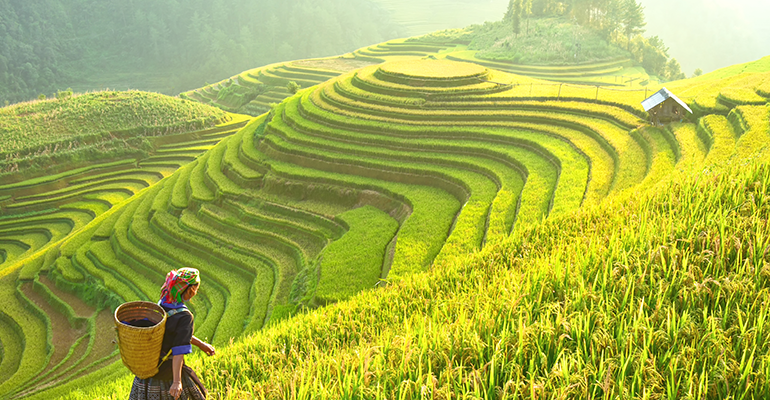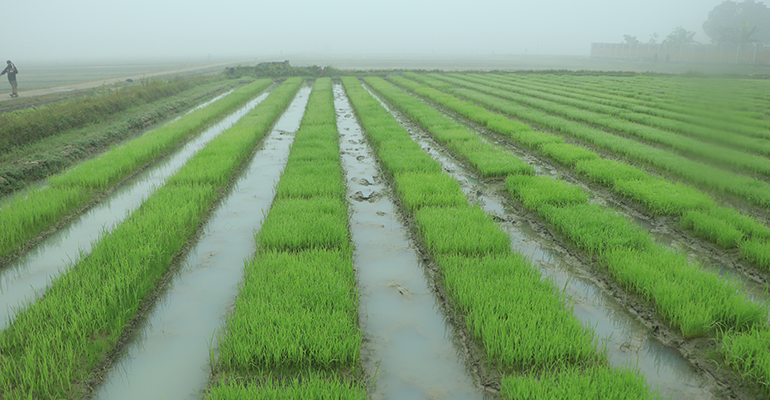News
Sustainable rice production: Ensuring long-term cultivation of the staple crop
23 Feb 2023In the drive for more sustainably produced foods, rice continues to fall under the microscope as a crop ripe for a ‘green’ overhaul, particularly its highly water-intensive cultivation methods and use of fertilisers and pesticides.
Greener approaches to farming the cereal crop are long overdue, especially as the climate crisis worsens and water scarcity grows.

The United Nations places rice as the third most cultivated crop worldwide following maize and wheat, and it is an important a staple food in developing countries. China and India are responsible for over 50% of rice production worldwide.
A number of initiatives designed to address the environment and social damage are being developed.
Kelloggs recently revealed the work it is involved in to mitigate some of the problems caused by rice production with InGrained and Syngenta, a five-year partnership with Lower Mississippi River Basin rice farmers to help reduce their climate impact.
In January, the organisation reported early results obtained during the pilot year of the programme, which it says has achieved a reduction of over 1,600 metric tons of greenhouse gases.
"Not only are we helping farmers implement new practices on their farms, but farmers are telling us that just as importantly, the quality of their rice was not affected by the adjusted irrigation practices," said Stacey Shaw, senior sustainability lead at Syngenta, co-programme collaborator.
Unilever, Lotus, and Mars’ efforts to embrace sustainable rice farming
In 2021, Unilever's Knorr rice and seasonings brand began introducing a series of farming approaches to conserve water and reduce carbon emissions at Knorr’s biggest rice supplier, Riviana, in Arkansas.
Other Food brands that have upped efforts in using sustainably produced rice in their products include Lotus Foods, Mars, and Spanish rice-to-pasta group Ebro Foods.
Consumers demand sustainable food
The motivations for this concerted action include consumer demands and changing preferences as to how food should be sourced and produced.
A survey requested by the European Commission appears to reinforce this, with 74% of Europeans assuming sustainable diets to be healthy, and 50% of those surveyed expect them to support the local economy.
The report, carried out by Kantar, also found around four in ten (40%) considered sustainable diets to “minimise waste”, and protect the environment (“what you eat is good for the planet” – 37%).
More importantly, there was an expectation by consumers that food producers and manufacturers were the key actors in making the food system sustainable, above public authorities.
 © iStock/Sakorn Sukkasemsakorn
© iStock/Sakorn Sukkasemsakorn
Around two thirds of those surveyed said that producers (farmers, fishers, aquaculture producers) (65%) have a role to play in making our food systems sustainable with nearly six in ten also cited food manufacturers (58%). National governments (47%) were the third most mentioned actor.
Sustainable Rice Platform (SRP) certification
In recent years, the number of initiatives and projects designed to encourage sustainable rice production has grown tenfold, as has efforts to establish an industry accepted certification to ensure practices remain consistent and measurable.
The Sustainable Rice Platform-Verified Label is arguably the most well-known of these schemes. Launched in 2020, the label was the result of an alliance between the United Nations Environment Programme (UNEP), the Sustainable Rice Platform (SRP) and a host of public, private, research, and civil society organisations.
The ecolabel works as an assurance to consumers that the rice produced is in accordance with SRP’s Standard for Sustainable Rice Cultivation that reduces the environmental impact of rice production.
“SRP was established to address global environmental and social challenges in rice production,” said Wyn Ellis, SRP executive director.
“The Assurance Scheme offers supply chain actors a robust, cost-effective and transparent path to sustainable procurement. Consumers are increasingly demanding that food is produced sustainably, and now they have a reliable way to choose environmentally friendly rice.”
SRP standard: A practical guide for the food industry
The SRP standard also serves as a practical guide for how the food industry can mitigate greenhouse gas emissions (GHG) from rice cultivation.
This is achieved along the supply chain starting with individual farmers, smallholder groups, and large farms, who apply SRP practices that include reduced consumption of fertilizers, efficient water drainage, and other cost-saving measures.
 © iStock/Hossain Mahmud Hasib
© iStock/Hossain Mahmud Hasib
Multinational corporations have since committed to buying SRP-certified rice and have set target percentages for the share of rice that is SRP-certified in their supply chains.
For example, Mars Food was amongst the first of these corporations to use the SRP Standard to benchmark its global rice supply chains and produce 100% of rice from SRP farmers by 2020.
In 2022, Olam expanded the company’s SRP programme to lift the incomes of 19,000 Thai smallholder farmers by more than 20% but also reduce GHG emissions from farming by 21%.